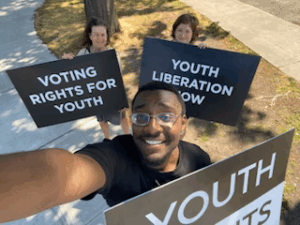This excerpt is just a small section from many essays, articles, documents, and letters written on discrimination due to lack of age that one can find on the internet:
Thomas Jefferson, one of the founders of this country said that “Those who would sacrifice a little freedom for a little security will lose both and deserve neither.” We are not a socialist state, the desires of the many do not out weigh the rights of the few. The rights of all groups and all individuals no matter how small, poor, weak, or unpopular, are sacred. Those rights are sacred regardless of what the majority beleives [sic] will increase public safety. That is one of the founding principles that this country is based on. The individual’s rights are sacred, they are beyond question, and they are most certainly beyond arbitrary time restrictions, set by intolerant politicians. (Gerber 1)
All of the authors of such papers are intelligent people who have felt the injustices of bias and they are attempting to end the injustices. Laws targeting teenagers of this era are every bit as immoral and unjustified as those that targeted African Americans in our past. This community is on a traceable downfall, and ageism is one of the problems that is taking it there. But, our community does not have to die. If people are willing to change and not dismiss this problem by thinking “That’s how it’s always been and always will be,” or “What can I do?” then the first step will have already been taken. If not, then our society will continue to digress until it collapses. The purpose of this paper is to help the earlier of these options come into being. Upon reading this paper I hope to have left with you an explanation of three things, (1) that discrimination due to lack of age does exist, (2) that it is a problem, (3) how this problem can be solved.
Curfews are commonly associated with lowering crime rates by keeping teenagers off of the streets during hours when crime is most likely to occur. This association is erroneous. Teenagers that are already operating outside of the law are more likely to commit a more serious misdemeanor. No logical studies have proven that curfews help to prevent crime; in fact, some statistics show they are actually counter-productive. In 1992 San Francisco repealed its forceful curfew laws, the results were astounding, between 1992 and 1997 there was a 50% decrease in juvenile murders, a 36% decrease in crime reported to the police, and a 41% decrease occurred in violent crimes reported to the police (Males 2). Yet curfews continue to spread and increase in strictness.
An informal poll taken by Joe Pelej reveals that most teenagers “generally feel persecuted by adults…. [T]his sense of alienation wasn’t the result of some stereotypical ‘hormone rampage’ [but rather] ageism’s tired corollary to racism’s ‘they’re all like that!'” (Pelej 1) On the Internet it is not uncommon to find sights devoted to just letting teens vent their problems with being discriminated against, and these sites are commonly seven to ten pages long (Age Discrimination 1-7). These teens vent their problems on these web pages because very few adults will listen.
A popular topic in the fight on discrimination due to lack of age is the age for driving legally. General society is told that teenagers are the main cause of accidents on the road and most believe this falsity because they are looking for someone to blame and teenagers are the easiest to place the blame on for any problem in society. However, most charts indicate that the age group between twenty-five and thirty-four are twice as likely to be in an accident than those in the age group categorized as below twenty (Accidents by Age Group 1).
The relation between discrimination against teenagers now and discrimination against African Americans in the past is very evident. In some communities African Americans were not allowed out at night past a certain hour, and curfews for teenagers are rampant in this country. For both of these groups a single incident can be used against them to suppress them beyond what should be done. Both groups were made scapegoats for the problems in their communities. During the time of racism the only reason that employers had to give to not hire somebody was ‘He’s black,’ likewise the only reason that employers have to give to avoid hiring teenagers is ‘He’s too young,’ regardless of the fact that frequently they are more qualified than the person that was hired. The moral violations that come from these discriminations are one in the same, and must be stopped.
Another popular topic in the debate over maturity is the voting age. Because teenagers are denied the right to vote, politicians can declare anything about teenagers that they feel will help them get another vote from an adult without having to worry about losing support from teenagers. Also, with the voting age set at eighteen the government has the ability to tax one’s income before he has any say in how he is represented. One of the founding principles of this country was “No taxation without representation.” The government has no right to tax anyone without first giving them the right to vote.
What I propose then, is that rather then having a rigid number to specify when one is responsible enough to do something or not, have a logical, non-chronological based point to allow one to do something. For example, I suggest the voting age be changed from an definitive chronological age to a situation analysis if the government widely affects their lives or not; also lowering the driving age coupled with encouraging parental involvement so that readiness to drive can be examined on an individual basis by the parents. By simply making changes similar to these and no longer branding all teenagers as delinquents society will have already taken the first step to recovery.
Sources
- “Accidents by Age Group” Accidents by Age Group 13 Jan. 2002 http://www.rescue5.com/images/junbyage.gif
- “Age Discrimination” Age Discrimination 14 Dec. 2001 http://members.austarmetro.com.au/-hunts/age.html
- “Don’t Raise the Driving Age” Silver Chips Online Opinion 13 Jan. 2002 http://www.mbhs.edu/silverchips/feb99/opinion/drivingcan.html
- Gerber, Jason. “The Curfew: Burning the Constitution” Essays of ASFAR 14 Dec. 2001 http://www.alcade.net/essays/tcbtc.htm
- Havens, Matthew. “Minnesota May Lower Voting Age” Essays of ASFAR 14 Dec. 2001 http://www.alcade.net/essays/mnva.htm
- Katz, Rebecca S. “Building the Foundation for a Side-by-Side Explanatory Model: A General Theory of Crime, the Age-Graded Life Course Theory, and Attachment Theory” 1999, Western Criminology Review 13 Jan. 2002 http:wcr.sonoma.edu/v1n2/katz.html
- Koroknay-Palicz, Alex. “Teenagers and Parenting” Essays of ASFAR 14 Dec. 2001 http://www.alcade.net/essays/tparen.htm
- Males, Mike. “Letter to LA Times Regarding Teen Driving Law” Essays of ASFAR 14 Dec. 2001 http://www.alcade.net/essays/mmletter.htm
- Males, Mike and Dan Macallair. “An Analyses of Curfew Enforcement and Juvenile Crime in California” 1999, Western Criminology Review 13 Jan. 2002 http:wcr.sonoma.edu/v1n2/males.html
- Pelej, Joe. “Age Bias Not Just for the Elderly” North County Times 14 Dec. 2001 http://www.nctimes.com/news/2001/20010218/zzz.html





